Israel-Hamas War: What happened on day 121?
Hamas reportedly demands release of more Palestinian terrorists in hostage deal • Netanyahu: We will not agree to any deal, and not at any price
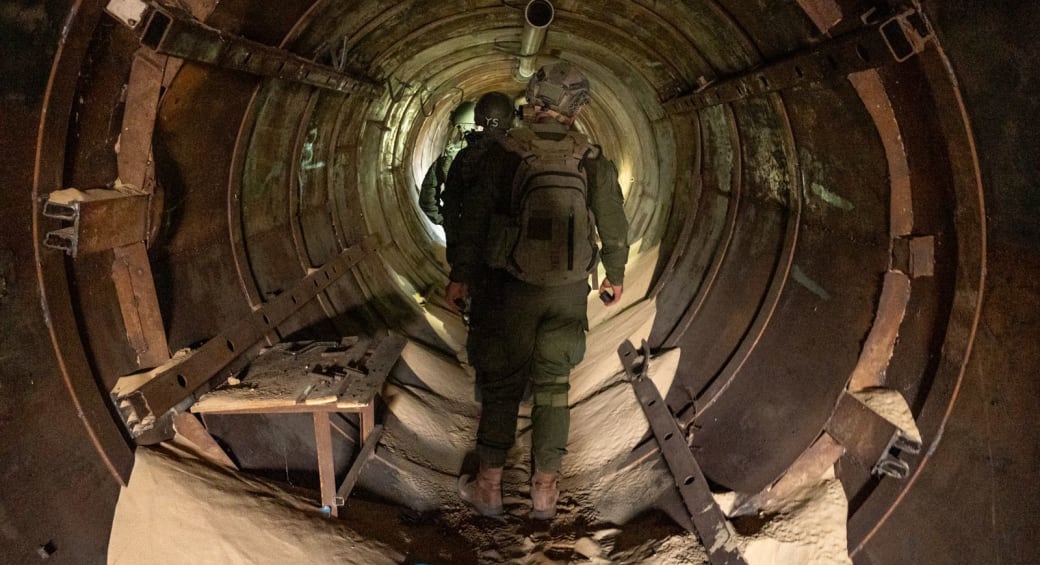
Rockets rain over Lebanon border, Israeli jets strike Hezbollah targets
IDF aircraft struck Hezbollah positions on Sunday, targeting infrastructure such as a rocket launch post and observation posts in the areas of Blida and Meis el-Jabal in southern Lebanon, the IDF stated.
Later, rockets from Lebanon were identified crossing the Israeli border, triggering rocket alarms in northern Israeli communities, including Kiryat Shmona, Menara, Margoliot, and Metulla.
In response, the IDF reported that it struck the sources of rocket fire.
Additionally, the IDF noted that Israeli tanks had struck a terrorist cell operating in the area of Blida.
Go to the full article >>Gaza humanitarian issues will be top Blinken priority, White House says
Humanitarian issues in Gaza will be a top priority for top US diplomat Antony Blinken on his current trip to the region, White House national security adviser Jake Sullivan said on Sunday.
A deal for the Palestinian militant group Hamas to release its remaining hostages during a humanitarian pause is in the US national interest, Sullivan said on CBS' "Face the Nation."
Go to the full article >>IRS urged to suspend UNRWA tax status amid October 7 investigation
The request came as the United States, along with numerous other countries, suspended UNRWA funding following a UN Watch report that claimed staff participated in October 7.
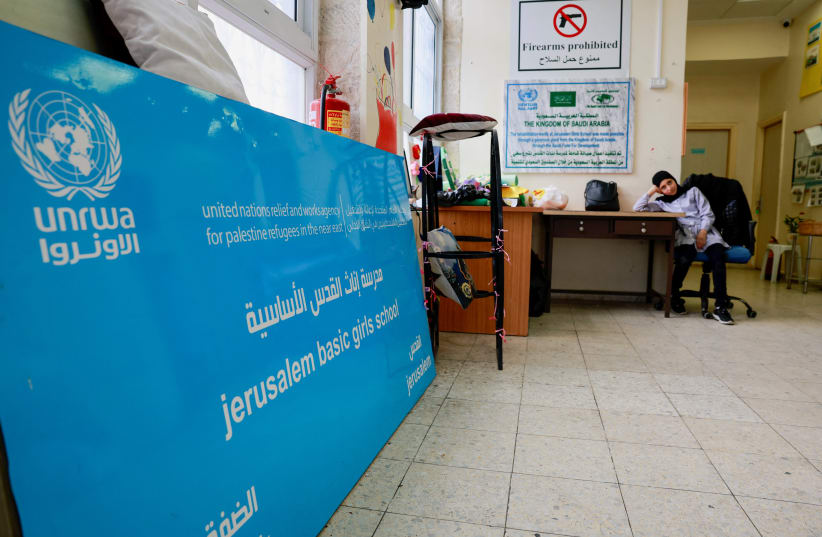
A Jewish organization in the United States wrote to the Internal Revenue Service (IRS) Commissioner Daniel Werfel, on Wednesday, to request the IRS suspend the United Nations Refugee Works Agency (UNRWA) non-profit status as investigations have been launched into its terror ties. Suspension of this status will prevent donations to UNRWA from being tax deductible.
While the letter, sent by the National Jewish Advocacy Center, acknowledged that Gazans need charitable support, "UNRWA is part of the problem, not the solution."
Justifying the change in status, the Jewish organization cited the IRS' policy, stating that activities of a Section 501(c)(3) organization must not be “illegal, contrary to a clearly defined and established public policy, or in conflict with express statutory restrictions.”
Go to the full article >>Netanyahu: We will not agree to any hostage deal at any price
"We will not end the war before we complete all of its goals: the elimination of Hamas, the return of all our hostages, and ensuring that Gaza will no longer pose a threat to Israel,” Netanyahu said.
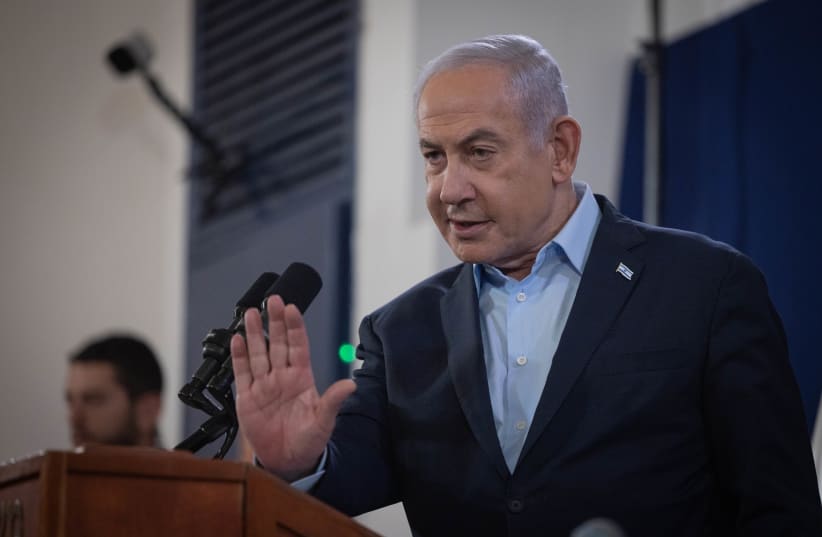
Israel won’t agree to pay any price to return the over 130 hostages held in Gaza, Prime Minister Benjamin Netanyahu told his government hours before Hamas was expected to deliver its response to the framework of an agreement reached in Paris last week.
"Efforts to free our abductees continue all the time,” Netanyahu said at the weekly meeting held in Tel Aviv amid reports that the Hamas response at 7 p.m. was likely to request the release of many Palestinians jailed for killing Israelis.
“We will not agree to any deal, and not at any price." Many things that are said in the media as if we agreed to them, such as what is related to the release of terrorists, we simply will not agree to,” Netanyahu said.
Under what terms will an agreement be made?
At issue between Hamas and Israel is the terror group’s insistence that a deal must include an end to the Gaza war, while Israel has stood on its principled position that it must be allowed to complete its military campaign to oust Hamas from the enclave.
"We will not end the war before we complete all of its goals: the elimination of Hamas, the return of all our hostages, and ensuring that Gaza will no longer pose a threat to Israel,” Netanyahu said.
To achieve this objective, the IDF has already destroyed 17 out of Hamas’ 24 battalions, Netanyahu said, as he explained that the remainder of the forces were in southern Gaza, including in Rafah.
He spoke of conducting “purification” operations to make sure that the battalions were disbanded. It’s also important, Netanyahu said, to continue destroying the Hamas underground tunnels, scubas the IDF has been doing in Khan Younis and other areas of Gaza.
Go to the full article >>Netanyahu to Ben-Gvir: I don't need help navigating Israel-US ties
"The prime minister needs to reprimand the national security minister, who, instead of taking care of internal security issues – is causing enormous damage to Israel's foreign relations," Gantz added
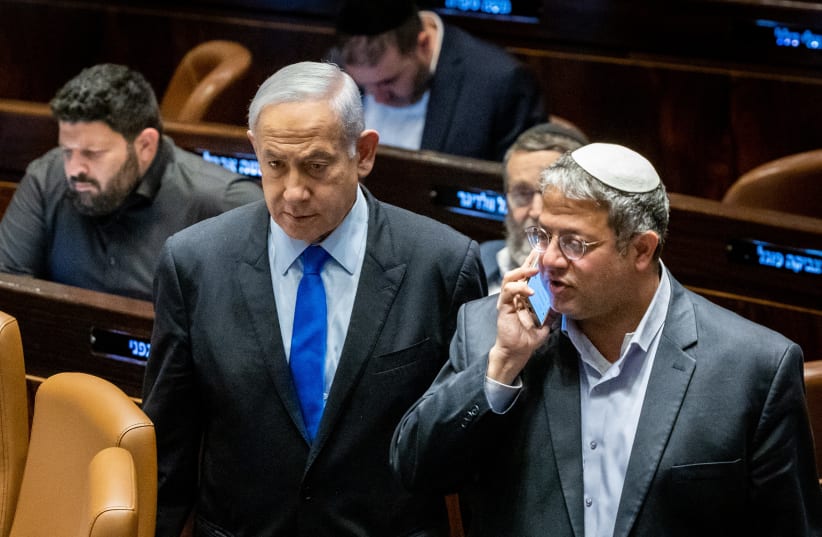
Minister-without-portfolio and National Unity chairman MK Benny Gantz, opposition leader and centrist Yesh Atid party chairman MK Yair Lapid, Labor chairwoman MK Merav Michaeli, and other Israeli politicians blasted National Security Minister MK Itamar Ben-Gvir's comment to The Wall Street Journal on Sunday that former US president Donald Trump would have been more beneficial to Israel in its current war against Hamas than current US President Joe Biden.
In the WSJ interview, Ben-Gvir said, "Instead of giving us his full backing, Biden is busy with humanitarian aid and fuel [to Gaza], which goes to Hamas. If Trump was in power, the US conduct would be completely different."
Prime Minister Benjamin Netanyahu said at the opening of Sunday's government meeting, "There are those who say 'yes' to everything in places where they must say 'no.’ They receive applause from the international community but endanger our national security. And there are those who say 'no' to everything, receive applause at home, but they too jeopardize vital interests."
Netanyahu added, "I would like to tell you something from my experience: The trick is to know how to navigate - to say 'yes' when possible, and to say 'no' when necessary. I don't need help to know how to navigate our relations with the US and the international community while standing by our national interests.”
Go to the full article >>Thomas Hand: 'Emily has code words for Gaza captivity'
At one point, Thomas recounted, a terrorist told the then-eight-year-old Emily: “Uskut” [Arabic for be quiet] or I’ll kill you with this knife.”
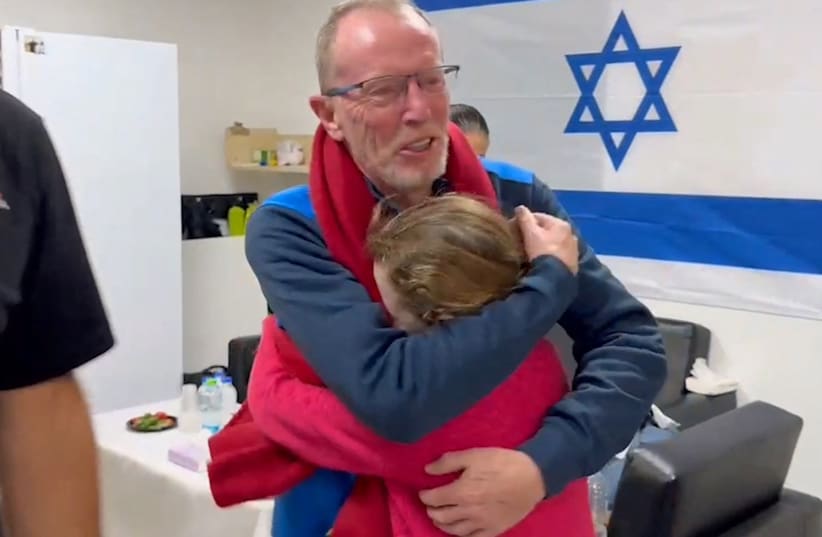
In a KAN News interview with Thomas Hand and his daughter Emily, Hand expounded upon his daughter's captivity in Gaza.
Emily was kidnapped from kibbutz Be’eri by Hamas terrorists on October 7. She was released on November 25 as part of a deal exchanging Israeli hostages with Palestinian prisoners.
Speaking of his daughter's recovery process following her 50-day captivity, Hand said, “She’s very, very good, making progress, recovering. The rest of us are broken now.”
Code words to recount captivity
He added that his daughter “doesn't say a lot” regarding her captivity, but rather “has code words for Gaza, terrorists…”
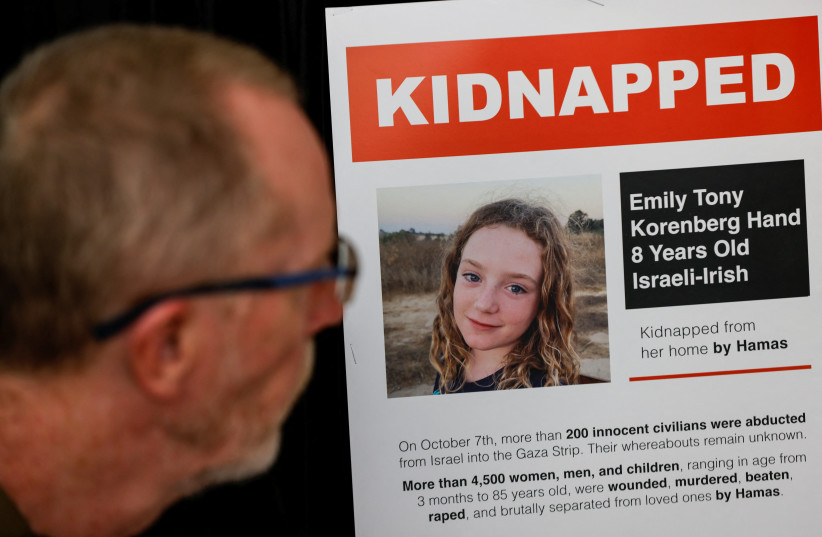
Turning to Emily, he asked: “What's Zeitim? [Hebrew for olives]?”
Emily promptly responded: “Terrorists.”
As the camera panned onto a whiteboard with a list of Emily’s code words, Thomas explained, "Any food or item that she doesn't like, she transfers that word into code."
Asked by the interviewer why she has codes, Emily said: “Sometimes it is uncomfortable for me to say these words.”
Thomas expounded upon the conditions in which Emily was detained. "I believed she was down in the tunnels because that’s the safest place, that's where they would treasure their hostages, but no, from the time she was kidnapped, they ran from one house…next morning, they ran to another house… presumably taking one step ahead of the IDF.”
In Gaza, Emily was mostly with men. When asked whether there was even one nice man in captivity, or as Emily termed it "the box," she answered categorically “no.”
At one point, Thomas recounted, a terrorist told the then-eight-year-old Emily: “Uskut” [Arabic for be quiet] or I’ll kill you with this knife.”
Hand told KAN that following her captivity, Emily "was immediately a bit more mature."
"She's insecure," adding, “She always wants to know that the door is locked, that the shutters are down; she wants to feel secure in the house.”
'IDF must complete its mission in Gaza'
With regard to a hostage deal, He noted that Israel has to release the Palestinian prisoners “within reason.”
Hand stated, “It's not a hostage deal, it's a swap of hostages for convicted prisoners…It's a very, very big risk. That’s why we have to completely destroy Hamas, from the top to the bottom.”
"In my head, at the time she was captive, I knew the IDF had to do everything in its power to destroy Hamas primarily and do everything they could to find and retrieve the hostages." Even though he was aware Emily might be killed in the process, this was a price he was willing to pay. But he emphasized, "So long as we destroy Hamas…if not all the terrible things that happened are pointless."
"We have to finish the job completely; I don't care what the world says."
Go to the full article >>Understanding the Hezbollah threat, by the numbers - analysis
The Hezbollah threat is clear, but it is also changing. The group has embedded itself within communities in southern Lebanon over the last decades.
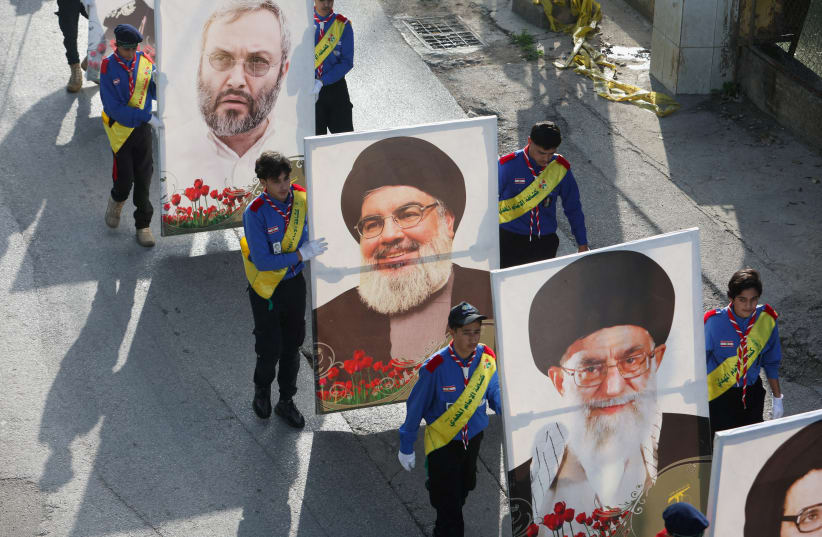
Israel is now focused on the Hezbollah threat. Hezbollah has been carrying out attacks since October 8 in the wake of the Hamas attack. Hezbollah fired more than 2,000 rockets at Israel between October 8 and January 9. It also fired dozens of anti-tank guided missiles and drones at Israel.
The Hezbollah threat is clear, but it is also changing. The group has embedded itself within communities in southern Lebanon over the last decades. It has built tunnels and bunkers and also built houses and posts used for observation of Israel.
On February 3, Israel Defense Forces spokesperson Rear Admiral Daniel Hagari gave an extensive statement focusing on the Hezbollah threat. It’s worth going over the data he provided and other data on the Hezbollah threat to underscore the issues facing northern Israel.
First of all, it’s worth noting that Israel evacuated the communities along the northern border in October, sending more than 80,000 people to live in hotels and other areas. In the last weeks, Israeli officials have often indicated how important it is for the Hezbollah threats to stop in the north. For instance, Israel’s Chief of Staff Herzi HaLevi said in January that the likelihood of conflict had increased. Israel’s Defense Minister was in Haifa last week and also warned of conflict.
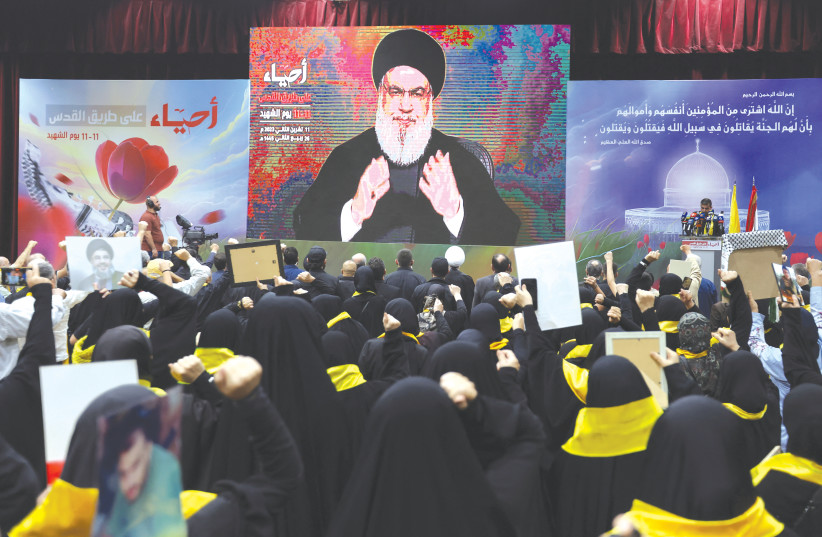
The Director General of Israel’s Ministry of Defense also visited the north last week and detailed the damage caused to some 430 homes on the border by Hezbollah attacks.
Israel has responded to the attacks, Hagari said on February 3, by deploying three IDF divisions along the border. Israel has also responded with defensive and offensive operations. Over 200 terrorists have been targeted, and 150 terror cells have been struck. 3,400 Hezbollah targets have been struck. 120 Hezbollah observation posts have been hit. Forty weapon storages have been struck. In addition, Israel struck over 40 “command and control” centers. The Hezbollah drone threat is also increasing. Israel has focused on this threat. It has also focused on preventing weapons from reaching Hezbollah via Syria.
Much of the campaign the IDF has waged was known because the IDF has released statements about daily retaliatory strikes on Hezbollah. The real question now is how Hezbollah may shift forces, whether Hezbollah has been degraded in its capabilities, and how it may respond. The Hezbollah threat was always believed to be much worse than the Hamas threat prior to October 7.
When Hamas was able to break through the border fence in 29 locations, massacre 1,000 people, and kidnap 240, this led to many questions about whether Hezbollah had been underestimated as well. This may not be the case. It may be that Hamas was able to exploit certain frameworks to achieve its brutal massacre and that Hezbollah faces some challenges that Hamas did not face. For instance, the terrain in northern Israel consists of hills on the border. Hezbollah can’t likely conduct the kind of human wave attacks that Hamas did.
Nevertheless, the Hezbollah threat is clear along the border. The organization has carried out near-daily attacks on Israel. However, it did not choose to join the war completely in support of Hamas. Instead, it was operationalized by Iran to conduct smaller attacks and to “normalize” this situation of attacks.
Prior to October 7, Israel would never have permitted Hezbollah to fire 2,000 rockets at Israel without a major conflict likely occurring. However, the desire to focus on defeating Hamas provided some cover for Hezbollah to change the paradigm in the north. The goal is to now shift that paradigm back. The Hamas massacre has also changed the feeling people in Israel have about seeing Hezbollah on the border. Now, it is understood that when the terror groups openly parade on the border, it can be a prelude to massacre.
Hezbollah was already pushing the envelope in 2022 and 2023. It had threatened Israel during the maritime negotiations between Israel and Lebanon, which took place on the eve of the last Israeli election in 2022. In addition, Hezbollah began to try to shift the border at Mount Dov, where it set up a tent.
Hezbollah's provocation tests Israel
This provocation was designed to see if it could create “facts on the ground” as to how Israel would respond. In general Hezbollah continued to provoke up until October 8 when its attacks began. Its attacks have provided Israel a right to respond.
There are several aspects of the Hezbollah threat that are now in focus. First, the Hezbollah drone threat has increased. The group has used an unprecedented number of drones since October 8 to threaten Israel. These have caused sirens to sound in numerous communities sometimes because the threat is complex, and drones can fly a flight path that is different than a missile. Hezbollah has also sought to target sensitive sites in the north, sometimes with drones or missiles.
Hezbollah may have over-reached. If it is not interested in a larger war, then it has become “too big to fail” in the sense that it carpeted southern Lebanon with too much terrorist infrastructure, creating many potential targets and leaving itself exposed.
The large number of targets Israel has struck is important, but it is unclear what percentage of the total they reflect. By the numbers, the Hezbollah attacks, which may have reached around 3,000 in number of munitions used, is similar to the number of retaliatory strikes. Is this a new version of the Cold War concept of “mutually assured destruction” doctrine where neither side wants to escalate too much?
On the other hand Hezbollah has changed the rules of engagement in the north, essentially tossing out everything since 2006 to begin its large number of attacks. Israel, which already waged a decade-long Campaign Between the Wars against Iranian entrenchment in Syria and support for Hezbollah, now faces the potential diminishing returns of a cycle of conflict with Hezbollah. For instance, the first 3,400 targets struck may have been important, but what about the potential for the next 3,400?
These are all key questions now in the north as the Gaza war passes its four-month depressing anniversary. Back during Passover 2023, there was a rocket barrage at Israel from Lebanon. This was considered a big deal back then. Now the communities targeted near Shlomi are evacuated.
I recall at the time, one man heard on the radio about the “cycle” of violence and shouted that it was not a “cycle,” but rather Hezbollah leader Hassan Nasrallah had started it. Indeed, Hezbollah started this round as well. Hezbollah, like Hamas, seeks the initiative. The challenge is taking that initiative from their hands.
IDF rolls out medical app for wounded soldiers status
Tablets with the special digital application have been distributed to the various war fronts to ensure that someone with the relevant electronic platform is nearby to take down the details.
The IDF announced Sunday that back in November, it rolled out a medical digital application to record and maintain the real-time medical status of wounded soldiers from the moment they get hurt on the battlefield through their transport to a medical center.
Until recently, medical evaluations of wounded soldiers in the field were taken down by hand, with many complexities involved in getting those documents undamaged and readable in a timely manner to the medical center where the soldier was transported.
Tablets with the special digital application have now been widely distributed to the various war fronts to ensure that someone with the relevant electronic platform is nearby to take down the medical details.
These devices are also with medical rescue staff who evacuate the wounded soldier from the battlefield to ensure that the moment the soldier arrives at the medical center, the hospital staff have all of the details from the battlefield and what medical care has already been given both during the transport period, which can be extended, and from the battlefield.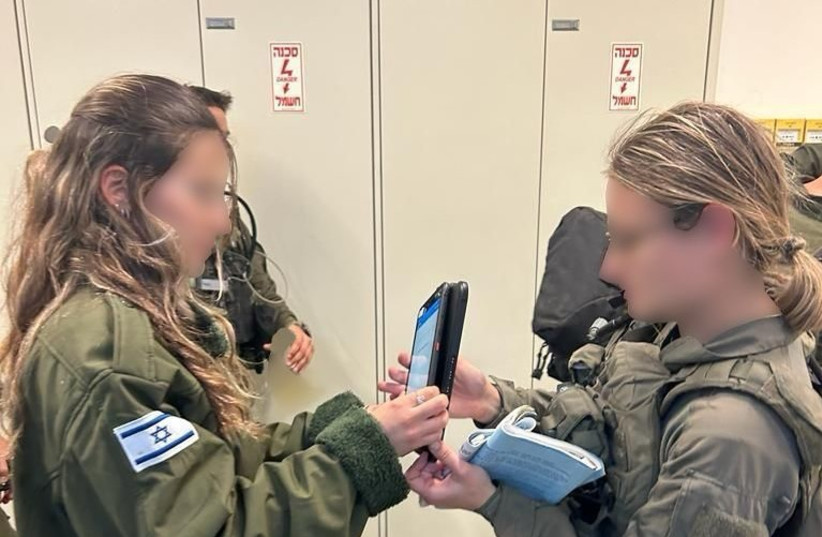
The application was developed and distributed after IDF medical officers spent extra time in the field to see up close the best way to utilize the devices and to operate the new program.
Go to the full article >>IDF targets vehicle in Rafah - Palestinian report
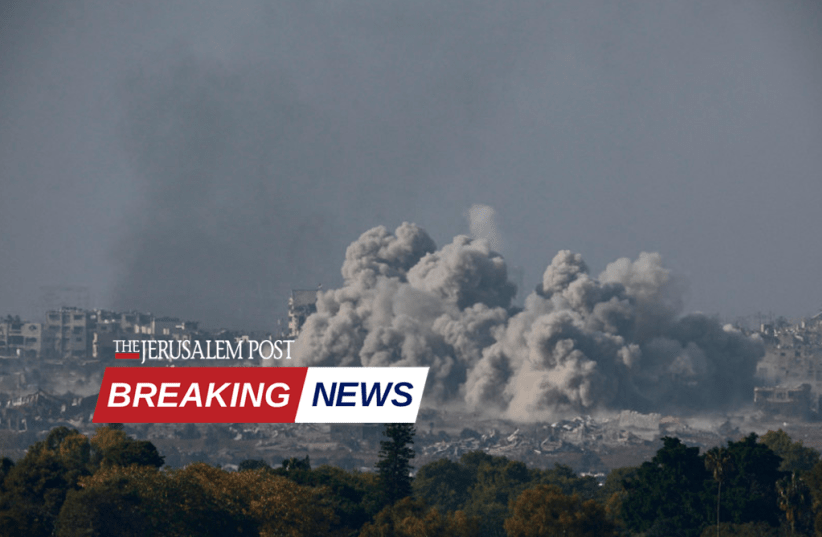
The IDF targeted a vehicle in what appears to be a specified assassination in Rafah in the southern Gaza Strip, Israeli media stated on Sunday, citing Palestinian reports.
Go to the full article >>Hamas set to deliver answer on hostage deal Sunday evening - report
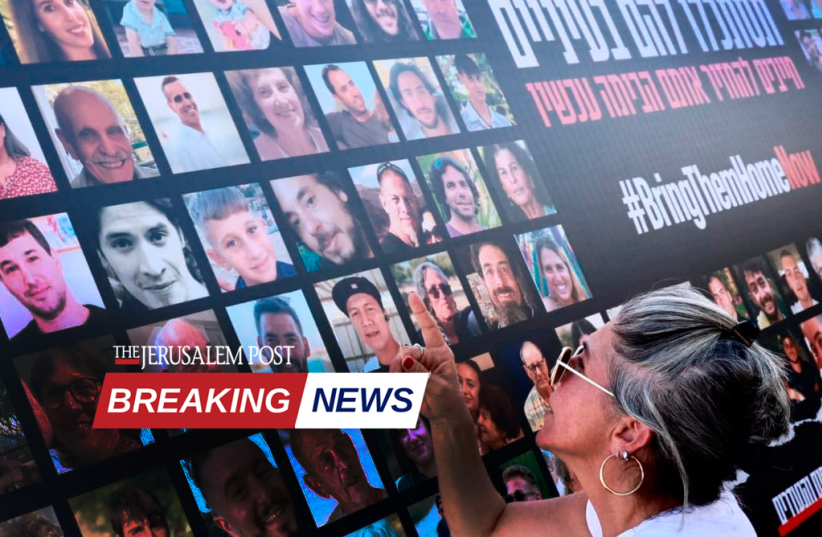
Hamas and the other Gaza factions will deliver their answer to the proposed hostage deal at 7 p.m. on Sunday, Maariv reported, citing the Saudi Arabian Al-Hadath channel.
Go to the full article >>Israel-Hamas War: What you need to know
- Hamas launched a massive attack on October 7, with thousands of terrorists infiltrating from the Gaza border and taking some 240 hostages into Gaza
- Over 1,200 Israelis and foreign nationals were murdered, including over 350 in the Re'im music festival and hundreds of Israeli civilians across Gaza border communities
- 136 hostages remain in Gaza, IDF says